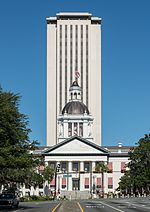Donald L. Tucker Civic Center

The Donald L. Tucker Civic Center is a multi-purpose indoor arena located on the Florida State University campus in Tallahassee, Florida, United States. The arena has the biggest capacity of any arena in the Florida Panhandle. The arena opened in 1981 and was built at a cost of over $30 million, financed by the city. In 2013, the venue was purchased by the Florida State University Board of Trustees. The facility is located on the southeastern side of the university's campus, between the FSU College of Law and the future home of the FSU College of Business. The arena is also located on the "Madison Mile", an economic development that connects the venue and Doak Campbell Stadium.
Excerpt from the Wikipedia article Donald L. Tucker Civic Center (License: CC BY-SA 3.0, Authors, Images).Donald L. Tucker Civic Center
West Pensacola Street, Tallahassee
Geographical coordinates (GPS) Address Website Nearby Places Show on map
Geographical coordinates (GPS)
| Latitude | Longitude |
|---|---|
| N 30.437842 ° | E -84.28669 ° |
Address
Donald L. Tucker Civic Center (Leon County Civic Center)
West Pensacola Street 505
32301 Tallahassee
Florida, United States
Open on Google Maps







